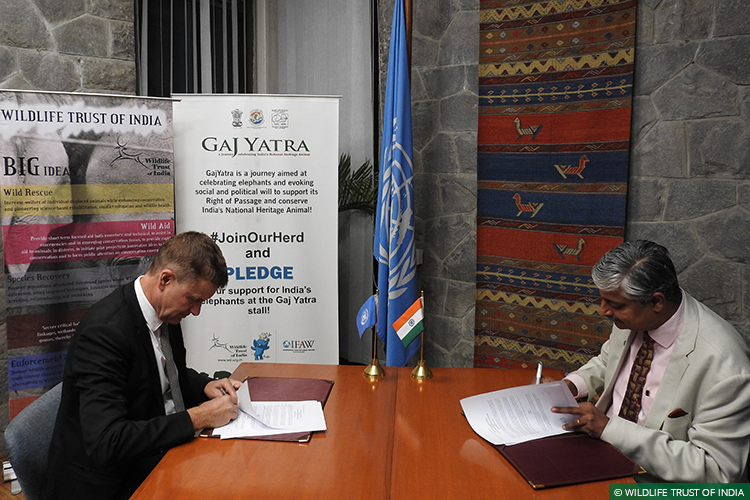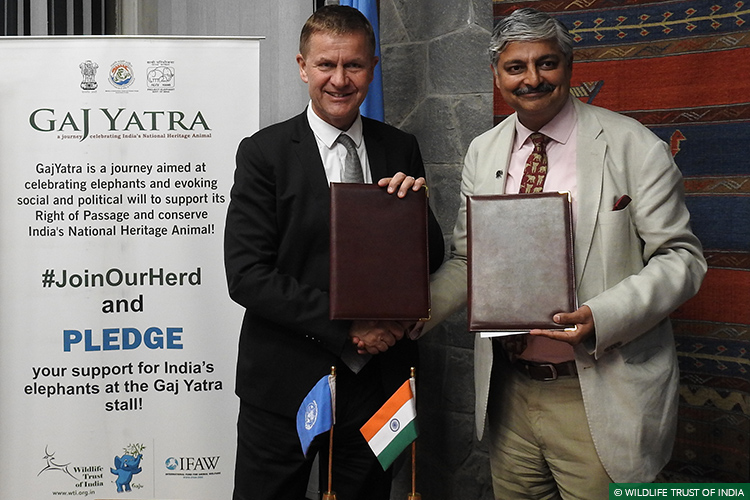 UN Environment Executive Director Erik Solheim and WTI Executive Director & CEO Vivek Menon signing the MoU at UN House
UN Environment Executive Director Erik Solheim and WTI Executive Director & CEO Vivek Menon signing the MoU at UN House
New Delhi, February 19, 2018: Committing to collaborate across a range of initiatives aimed at protecting India’s natural heritage and specifically its National Heritage Animal, the Asian elephant, UN Environment (UNEP) and Wildlife Trust of India (WTI) have signed a Memorandum of Understanding (MoU).
The MoU emphasises WTI and UNEP’s shared goal of creating a blueprint to protect India’s wild elephants and their habitat, and specifically working to ensure their unhindered passage through the 101 vital migratory corridors identified across the country. UN Environment Executive Director Erik Solheim and WTI Executive Director & CEO Vivek Menon signed the MoU at UN House this evening, with UNEP Country Head Atul Bagai and members of the media in attendance.
India has about 27,000 wild Asian elephants (Elephas maximus); over 50% of the species’ estimated global population. Yet these natural nomads face an increasingly uncertain future in the country. The growing resource needs of India’s human population have led to the destruction and fragmentation of wild habitats, depleting the area available for elephants to roam and causing the loss of their traditional migratory paths.
Protecting elephants and securing their Right of Passage means protecting India’s carbon sinks, its sources of clean air and freshwater. This vital partnership with UNEP will lend a renewed focus and urgency to WTI’s efforts in this regard.” ~ Vivek Menon
Elephant corridors are vital natural habitat linkages that enable elephants and other wildlife to move through the degraded habitats lying between larger protected forests freely, without being disturbed by humans. With Asian elephants now occupying a meagre 3.5 percent of their historical range, securing these corridors has become a conservation imperative. WTI has been working with the Government of India’s Project Elephant, state forest departments, and national and global NGOs to secure and protect elephant corridors for over a decade through its Right of Passage project. Last year, in partnership with the International Fund for Animal Welfare (IFAW), WTI launched the ‘Gaj Yatra’, a campaign to raise mass awareness about the plight of elephants and build a groundswell of popular support for the securing of elephant corridors. WTI Brand Ambassador Dia Mirza, who last November was appointed UN Environment’s Goodwill Ambassador for India, has been championing right of passage for elephants and is a prominent face of the Gaj Yatra campaign.
“So much of India’s rich biodiversity depends upon the survival of our elephants”, said WTI CEO Vivek Menon. “They are the architects of our forests, from whence our rivers flow. Protecting elephants and securing their Right of Passage means protecting India’s carbon sinks, its sources of clean air and freshwater — which are essential to the nation’s future. Securing the country’s natural heritage is at the core of WTI’s mission and this vital partnership with UNEP will, I believe, lend a renewed focus and urgency to our efforts in this regard.”
“Fewer elephants are a sign of environmental disaster. It is vital that governments, local communities and industry work together to provide the breathing space that elephants need to thrive. Only then can we ensure human wellbeing and the survival of our ecosystems”, said Erik Solheim, United Nations Under-Secretary-General and Head, UN Environment.
“As WTI’s Brand Ambassador and UN Environment’s Goodwill Ambassador to India, it gives me immense satisfaction to see the two organisations initiate this close partnership”, said Dia Mirza. “Elephants are a keystone species and enabling their free movement through increasingly fragmented habitats is vital to the protection of India’s natural heritage. It’s time we give elephants their right of passage and I look forward to working towards this with WTI and UNEP, particularly by helping create mass awareness through the Gaj Yatra campaign.”
